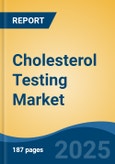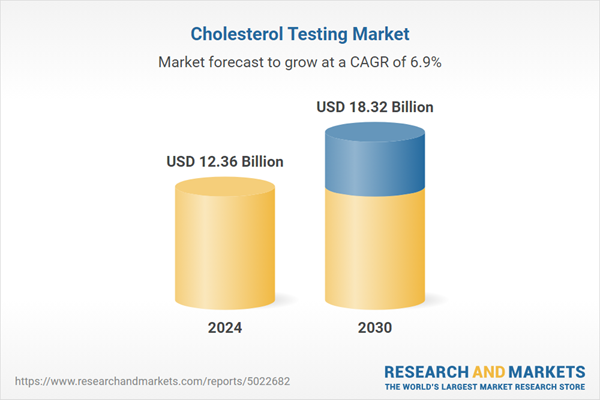Speak directly to the analyst to clarify any post sales queries you may have.
10% Free customizationThis report comes with 10% free customization, enabling you to add data that meets your specific business needs.
Elevated LDL levels and low HDL levels can increase the risk of plaque buildup in arteries, leading to restricted blood flow and serious heart complications. Routine cholesterol testing is particularly important for individuals with a family history of heart disease, those with diabetes, or people leading sedentary lifestyles with poor dietary habits.
Early detection of abnormal cholesterol levels allows for timely lifestyle changes or medical interventions, such as adopting a healthier diet, increasing physical activity, or using cholesterol-lowering medications. Since cholesterol levels can be influenced by various factors - including age, genetics, diet, and overall health - it is essential to consult with a healthcare professional. They can interpret the results accurately and recommend personalized strategies for managing cholesterol and maintaining long-term cardiovascular wellness.
Key Market Drivers
Rising Prevalence of Cardiovascular Diseases
Cardiovascular diseases, including heart attacks and strokes, often have subtle or asymptomatic early stages. For instance, according to a 2024 article, coronary artery disease (CAD) is a common yet serious heart condition that can lead to heart attacks. A recent study, published in the European Heart Journal, highlights that measuring apolipoprotein B particles and lipoprotein(a) levels may improve risk prediction for CAD. These lipoproteins carry "bad" cholesterol in the blood and play a critical role in plaque buildup in coronary arteries.The Centers for Disease Control and Prevention (CDC) states that CAD is caused by plaque accumulation in the arteries supplying blood to the heart, emphasizing the importance of early screening and preventive care. Cholesterol testing helps identify individuals with high cholesterol levels, who are at an increased risk of developing CVDs. Early detection allows for timely intervention and lifestyle changes that can help prevent or manage the progression of these diseases. Cholesterol testing provides valuable information for risk assessment and stratification. Individuals with elevated cholesterol levels are categorized as high-risk patients for CVDs.
This categorization helps healthcare providers tailor treatment and management strategies, potentially preventing future cardiovascular events. For individuals diagnosed with CVDs or at risk of developing them, cholesterol testing is used to monitor the effectiveness of treatments such as medication, dietary changes, and exercise. Regular testing helps healthcare professionals adjust treatment plans as needed to achieve target cholesterol levels. The rising prevalence of cardiovascular diseases underscores the importance of cholesterol testing as a critical tool for prevention, early detection, and management. The increasing demand for cholesterol testing is a natural response to the need to address the growing burden of CVDs and their associated risk factors.
Key Market Challenges
Technological Limitations
While point-of-care testing devices and home testing kits have improved accessibility, their accuracy might not always match that of laboratory-based testing, potentially affecting diagnostic reliability. Point-of-care testing devices and home testing kits might yield results that can vary from one test to another or from laboratory-based measurements. This variability can lead to uncertainty in interpreting results and making clinical decisions. Home testing kits and point-of-care devices rely on individuals performing the test correctly.User errors, such as improper sample collection or incorrect device operation, can significantly impact the accuracy of results. Proper calibration and maintenance of testing devices are crucial for accuracy. Without regular calibration and quality control, point-of-care devices might drift from accurate results over time. Inaccurate results from point-of-care testing or home testing kits can impact clinical decision-making. Incorrect management strategies based on unreliable results might harm patient outcomes.
Key Market Trends
Personalized Medicine
The trend toward personalized medicine will likely extend to cardiovascular health. Cholesterol testing can provide essential data for tailoring interventions and treatment plans based on an individual's unique risk profile. The trend toward personalized medicine has the potential to greatly impact cardiovascular health, and cholesterol testing plays a vital role in this shift. Personalized medicine aims to provide individualized healthcare based on an individual's unique genetic makeup, lifestyle, and other factors. Cholesterol testing offers essential data that can help tailor interventions and treatment plans specifically for an individual's risk profile.Based on an individual's cholesterol levels, genetic factors, medical history, and other health metrics, healthcare providers can create personalized treatment plans. This might involve lifestyle modifications, medication choices, and specific targets for cholesterol levels. Personalized medicine involves continuous monitoring of an individual's health markers. Cholesterol testing serves as a valuable tool for tracking progress and ensuring that the chosen interventions are effective. Regular testing encourages patient adherence to treatment plans. For individuals who require cholesterol-lowering medications, personalized medicine can guide the choice of medications and dosages. Certain medications might be more effective or better tolerated based on an individual's genetic and metabolic factors.
Key Market Players
- Abbott Laboratories Inc.
- Beckman Coulter Inc.
- Horiba Ltd.
- Nova Biomedical
- Roche Holding Ag (F.Hoffmann-La Roche Ltd.)
- Randox Laboratories Ltd.
- Siemens Healthineers Gmbh
- Sekisui Diagnostics LLC
- Sinocare Inc.
- Thermo Fisher Scientific Inc.
Report Scope:
In this report, the Global Cholesterol Testing Market has been segmented into the following categories, in addition to the industry trends which have also been detailed below:Cholesterol Testing Market, By Product Type:
- Test Kits
- Test Strips
- Other
Cholesterol Testing Market, By Test Type:
- Total Cholesterol Test
- High-Density Lipoprotein (HDL) Cholesterol
- Low-Density Lipoprotein (LDL) Cholesterol
- Triglycerides/VLDL Cholesterol Test
Cholesterol Testing Market, By Prescription Mode:
- Over the Counter
- Prescription Based
Cholesterol Testing Market, By End User:
- Hospitals & Clinics
- Diagnostic Laboratories
- Others
Cholesterol Testing Market, By Region:
- North America
- United States
- Canada
- Mexico
- Europe
- France
- United Kingdom
- Italy
- Germany
- Spain
- Asia-Pacific
- China
- India
- Japan
- Australia
- South Korea
- South America
- Brazil
- Argentina
- Colombia
- Middle East & Africa
- South Africa
- Saudi Arabia
- UAE
Competitive Landscape
Company Profiles: Detailed analysis of the major companies present in the Global Cholesterol Testing Market.Available Customizations:
With the given market data, the publisher offers customizations according to a company's specific needs. The following customization options are available for the report.Company Information
- Detailed analysis and profiling of additional market players (up to five).
This product will be delivered within 1-3 business days.
Table of Contents
Companies Mentioned
- Abbott Laboratories Inc.
- Beckman Coulter Inc.
- Horiba Ltd.
- Nova Biomedical Corp.
- Roche Holding Ag (F.Hoffmann-La Roche Ltd.)
- Randox Laboratories Ltd.
- Siemens Healthineers Gmbh
- Sekisui Diagnostics LLC
- Sinocare Inc.
- Thermo Fisher Scientific Inc.
Table Information
| Report Attribute | Details |
|---|---|
| No. of Pages | 187 |
| Published | August 2025 |
| Forecast Period | 2024 - 2030 |
| Estimated Market Value ( USD | $ 12.36 Billion |
| Forecasted Market Value ( USD | $ 18.32 Billion |
| Compound Annual Growth Rate | 6.9% |
| Regions Covered | Global |
| No. of Companies Mentioned | 10 |









